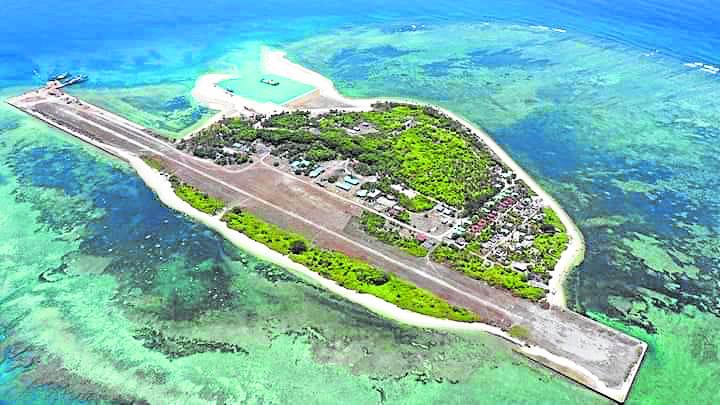Preserving the West Philippine Sea as natural treasure

As news of the publication of the West Philippine Sea (WPS) State of the Coasts Report reached me, I eagerly delved into my collection of books and unearthed a long-lost favorite co-authored by my mentor, Dr. Porfirio Aliño. Titled “An Underwater Guide to the South China Sea,” published in Singapore by Times Editions, this gem from 1992 stands out as an exemplary collaborative effort between two esteemed marine scientists in the region, Dr. Chou Loke Ming from Singapore and Dr. Aliño from the Philippines.
The lead author, Dr. Chou Loke Ming, is affiliated with the National University of Singapore. Joining him was a young Dr. Aliño of the University of the Philippines (UP), who had just returned from his PhD studies in Australia at that time. While there were already regional-scale marine research collaborations being undertaken at that period, notably the ASEAN-Australia Living Coastal Resources Project, my home project that supported my master training at the UP Marine Science Institute (UP MSI), one particularly significant initiative was the Joint Marine Scientific Research Expedition (JOMSRE).
This joint effort between Vietnam and the Philippines holds particular relevance to my piece today, especially considering the involved parties’ claims in the WPS. This scientific endeavor spanned 13 years, from 1994 to 2007, during which four expeditions were conducted in various locations, specifically in the Spratly Islands, between 1997 and 2007. In 2021, the Philippines and Vietnam agreed to resume JOMSRE. This agreement was reached during the 9th Philippines-Vietnam Joint Permanent Working Group on Maritime and Ocean Concerns (JPWG-MOC) on November 8 of that year, suggesting a bright future for marine research collaborations in the WPS.
In a time when the WPS was still commonly referred to by Filipinos as the South China Sea (SCS), the book shed light on crucial insights into the region’s marine ecosystems. One particular aspect that continues to resonate with me, and is now a cornerstone of my teachings, is the intricate water circulation patterns within the SCS. Dating back to the pioneering work of Wyrtki in 1961, these circulation patterns underscore the interconnectedness of marine life across the sea, emphasizing the imperative for nations with vested interests in the area to collaborate in its conservation and sustainable use.
The stark reality that water currents serve as conduits for the dispersal of vital marine organisms transcending geopolitical boundaries underscores the urgency for joint efforts in safeguarding this shared natural heritage. Could the establishment of protected areas be a viable solution? Legal frameworks such as the Biodiversity Beyond National Jurisdiction (BBNJ) under the United Nations Convention on the Law of the Sea (UNCLOS) and Ecologically and Biologically Significant Areas (EBSAs) under the Convention on Biological Diversity (CBD) offer avenues for collaborative conservation initiatives. Within our respective territorial waters, the creation of networks of Marine Protected Areas (MPAs) and concerted efforts towards sustainable fisheries management can serve as anchors towards preserving the WPS as a common natural treasure for generations to come.
Harmony in scientific exploration
The area is vast and holds immense potential for marine research, but embarking on an expedition would undoubtedly cost a fortune. Therefore, collaboration among experts, institutions, and organizations from claimant countries is essential to make such a venture feasible. By pooling resources and expertise, the burden of seeking funds can be lightened, allowing the focus to remain on the valuable scientific work that can be conducted in this promising marine environment.
Referring to the recently published “The West Philippine Sea: State of the Coasts Report” by UP MSI, I am pleased to see a renewed focus on the WPS. The fact that a copy is easily accessible on the institute’s website is also noteworthy (https://msi.upd.edu.ph/downloads/wps-soc-2024/). This report not only highlights the ecological, economic, and social importance of the area but also brings attention the negative impacts of competition and the lack of cooperation among the countries with claims in the region. By examining the tragedy of the commons in the context of the WPS, these consequences are further underscored, serving as a poignant reminder of Chou and Alino’s plea from three decades ago. It stresses the fact that the South China Sea is a shared heritage among all nations making claims in the region.
Without a proper management strategy in place, the degradation of marine resources in the WPS will persist. The report underscores the impacts of human activities on these resources, revealing significant challenges such as pollution—particularly from plastic waste—as well as overexploitation of resources.
Illegal fishing practices and insufficient management efforts present ongoing threats, worsened by escalating coastal development, sedimentation, and diminishing habitat quality. Moreover, geopolitical tensions in the area may have exacerbated these issues, resulting in habitat deterioration, harmful fishing techniques, and economic hardships for Filipino fishermen. These tensions also impede research, monitoring, and effective resource management measures, creating a complex and pressing array of challenges for the conservation of coastal and marine resources in the WPS.
The West Philippine Sea plays a crucial role in the nation’s biodiversity, ecology, and economy. It serves as a source of national pride and a precious natural heritage that warrants our conservation efforts and sustainable use for the prosperity of future generations of Filipinos as stated in the report. Furthermore, I envision a future where designations such as WPS and SCS lose their relevance, and people unite to strive for the collective welfare of our species, Homo sapiens.
Dr. Michael P. Atrigenio is an Assistant Professor at the Marine Science Institute of the University of the Philippines Diliman and the program head of the Professional Masters in Tropical Marine Ecosystems Management Program. He is also the President of the Marine Environment and Resources Foundation.
















